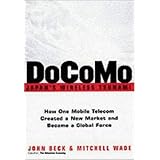
Average Reviews:

(More customer reviews)Chapter one of this pathetic book begins by informing us that "Business cases aren't romance novels. Things begin, and end, with the numbers". Not so this book. As well as seemingly endless diversions into such eclectic themes as post war land reform in Japan, General MacArthur's victorious cavalcade into Tokyo, hitch hiking in New England, some unfathomable nonsense about the "mystic Southwest" of the United States, a reference to Mary Poppins, a couple of paragraphs on Bruce Springsteen, the problems of mowing lawns in Utah, the relatively high mortality rates of upper class Britons during both world wars, Maslow's hierarchy of needs, the usual sociological drivel of upwardly pointing nails getting hammered down in Japan, some buzz words from complexity theory, some tips on putting golf balls and interminable pages of insipid tips on how to turn your (non Docomo related) work into fun, we are given six shallow chapters respectively titled Love, Inequality, Impatience, Luck, Fun and Strength with a further appendix called Intimacy and M-Commerce. That is followed by a mercifully short interview with Docomo President Kouji Ohboshi, which, because it was originally carried in 1996, is, like the entire book, totally irrelevant to the current market conditions Docomo faces.
Although the book's blurb claims the authors had unprecedented access to Docomo's top executives, there is no evidence of that in this over priced book. We are, however, told that Ohboshi "looks like a conventional Japanese executive. He is tall". We are also told that he has the style of a cockroach, meaning that he is impatient and hurries around a lot. Because cockroaches tend to get stamped on, it is a dangerous and, at best, very silly metaphor to describe a dynamic CEO of a thriving company.
It is almost as silly as the 20 or so pages given to the digital experiences of Yasuko Sato who, we are told, had to overcome the sad fact that "Mama and Papa Sato lovingly, relentlessly instilled good old-fashioned analog values in their daughter." Although Mama and Papa Hayes did the same, I have used mobile phones in the jungles of the Golden Triangle and the Andes Mountains as well as in a fishing trawler 300 miles off the coast of Iceland. Talking about the wonders of i-mode or mobile phones in the tones Mitch and John (as they annoyingly call themselves throughout the book) is like talking of the wonders of black and white TV; they are old news.
To impress on us how successful Docomo has been, we are supposed to be amazed that its headquarters are in "a skyscraper so large that each elevator holds sixty-three people. Sixty-three! In just one elevator!" As if that was not penance enough for us to bear, the authors appeal to our vanity by telling us that we are the new "cosmopolitan, global kind of thinker" because we are reading a "whole book" on Docomo.
Instead of giving us a "whole book" on Docomo, all they serve us up is the most shameless padding that would make the laziest high school student blush. Only two paragraphs after mentioning "those alphabet soup economics equations that make so little sense to most of us", we read "Okay, enough about boring economic theories" and we are back to the problems of mowing the lawns of Utah.
Technical details are also, we are told on page 127, "perennially boring" even though they are vital to understand Docomo's short history as well as its prospects for future success. The mobile telephony industry Docomo finds itself in is a young industry, one that will mature in time just as wireless, television and the Internet did before it. Until that happens, the industry's many intangibles will complicate our best efforts to predict the industry's future trends. Instead of trying to identify those intangibles, the authors let us know that "what we can tell you, after years in think thanks and universities and high-powered consulting firms" is that luck is paramount in a successful business.
This is easily the worst business book I have ever read, let alone reviewed.
Click Here to see more reviews about: DoCoMo--Japan's Wireless Tsunami: How One Mobile Telecom Created a New Market and Became a Global Force

0 comments:
Post a Comment